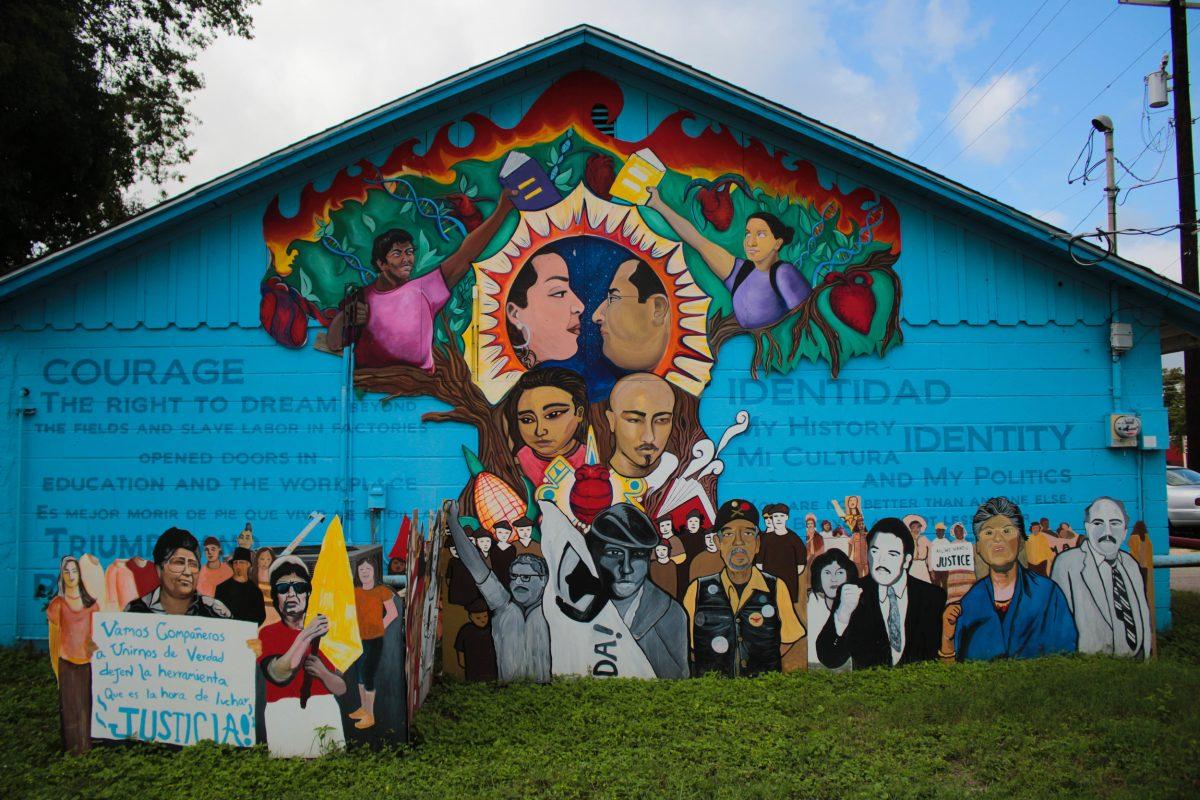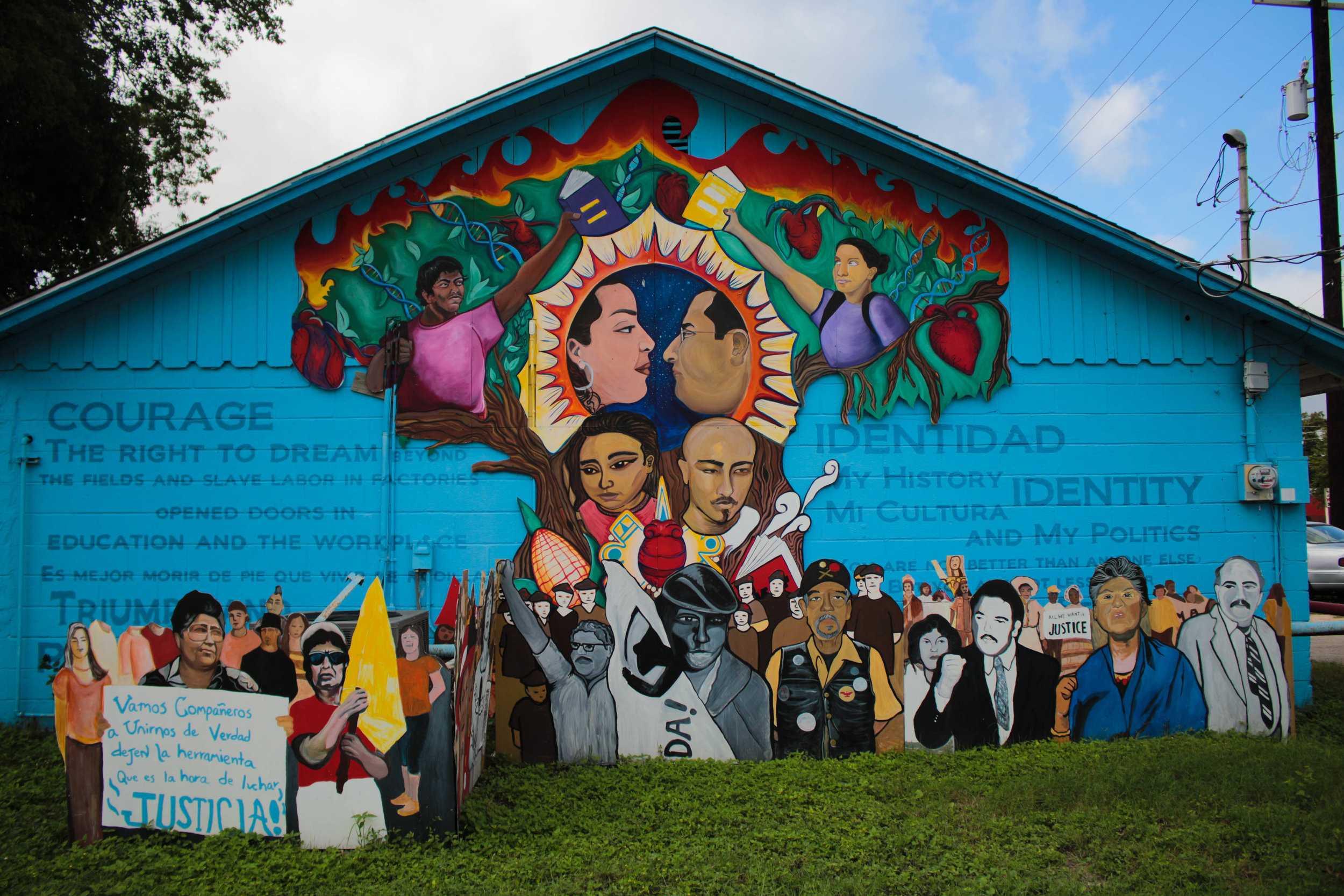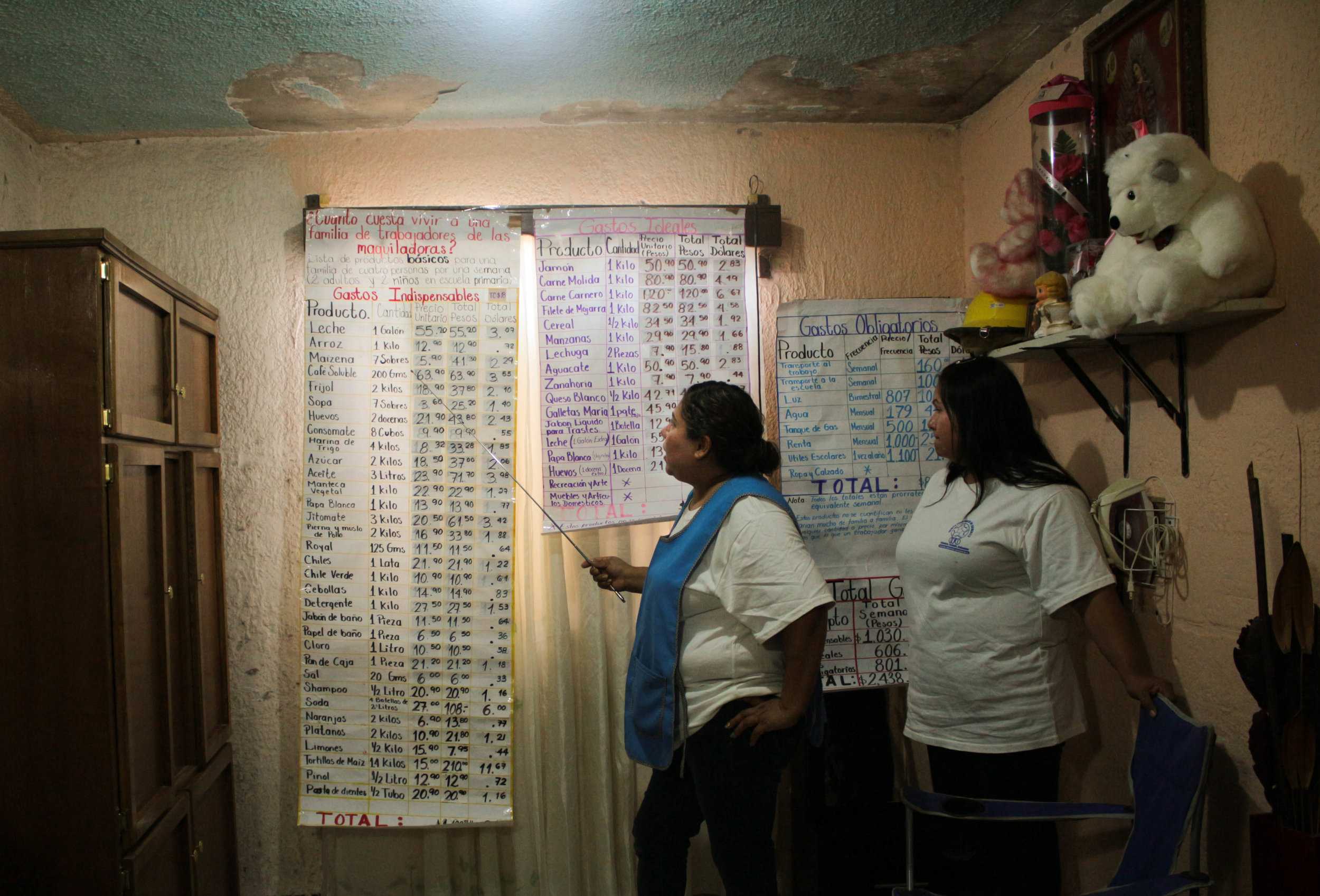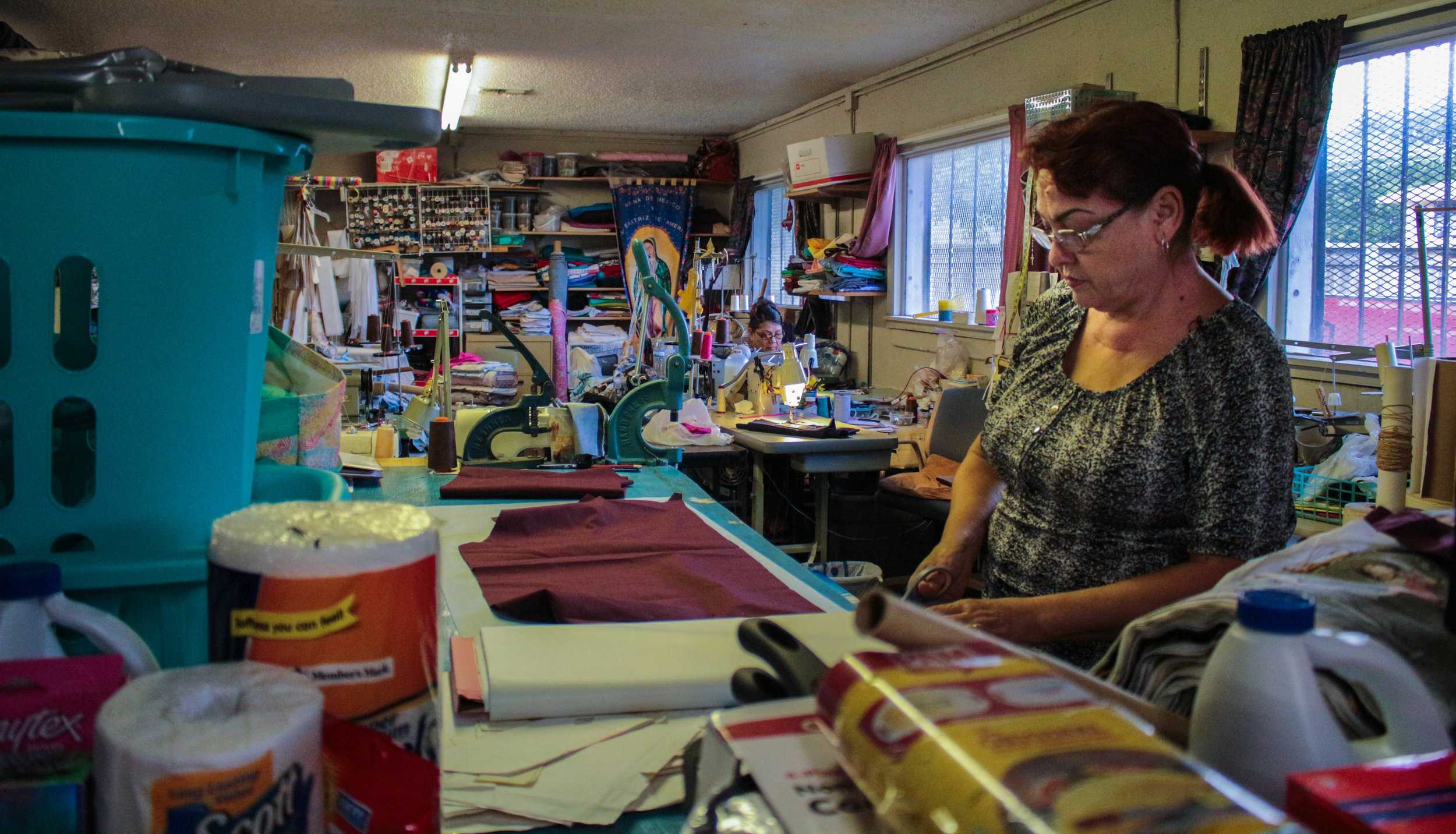Mural of Chicanx activists decorate the side of Fuerza Unida’s building.
Editor’s Note: Interviews have been translated from Spanish.
As renegotiations of the North American Free Trade Agreement continue, it is important to tell the stories of those who have been affected by these policies.
By Ashley Nava
On the weekend of Oct. 13-15, a delegation with Austin Tan Cerca de la Frontera (Austin So Close to the Border) shined light on the lives of maquiladora workers.
Working Women
Gabriela Moreno sleeps two to three hours nightly. At 8 a.m., she is awake getting her grandson ready for school. After checking on her disabled and diabetic mother, she leaves for work at her “maquiladora” or factory job. Every second counts because punching in late results in pay or bonus loss. After her grueling six-hour shift ends at 4 p.m., Moreno prepares for her second 13-hour shift, with only an hour in between to rest. The next day she does it all over again.
Moreno’s demanding work schedule is not unique, but rather ubiquitous in Piedras Negras, Mexico, an industrial border city grating against the edges of Eagle Pass, Texas. “I don’t know how I do it,” Moreno says. “There is no time in the day to be tired. I do what I have to do to provide for my family. Even then I barely make ends meet.”
The current peso value leaves maquiladora workers like Gabriela Moreno and Enriqueta Perez with about $50 dollars left over each month to cover additional expenses.
For most maquiladora workers, pay is abysmal at about ten dollars a day. Despite this, when Moreno isn’t picking up extra shifts she spends her free time working alongside with Julia Quiñonez, director of Comité Fronterizo de Obrer@s (Border Committee of Workers), a grassroots organization fighting for labor and human rights for maquiladora workers.
Committed to raising awareness about the unjust conditions along the Texas-Mexico border, ATCF dispels the “official narrative” about NAFTA. Through their delegations, hosted three times a year, they offer a firsthand view of maquiladora laborers’ communities through house visits, worker-led tours of the industrial parks and honest, one-on-one conversations.
The border fence that divides also hides. As a native El Pasoan, the border has defined my life. From my Spanglish to the mixed legal statuses of my family members, I have known nothing but the border until I came to the University of Texas at Austin. On the frontera, one hears of many maquiladoras but may not know much about them.
Solidarity Not Charity
The concept of the delegation was to arrive with “manos vacias,” or “empty-handed,” so that one could be open to learning. Eliminating the “savior complex” toward southern neighbors establishes a relationship of mutual empowerment. I quickly learned that it was not “us and them,” but rather a “we” that transcends borders, nationalities, race and gender. This idea allows for a fruitful relationship between ATCF, CFO and Fuerza Unida.
The first stop was at a quiet, mostly Hispanic neighborhood in the south side of San Antonio, Texas. Decorated with a mural of organizers and leaders of the Chicano movement, a humble building housed Fuerza Unida.
Viola Casaras, co-founder and director of Fuerza Unida, became jobless when Levi Strauss Factory shut down in San Antonio.
Inside we met with co-founders and directors Viola Casaras and Petra Mata of Fuerza Unida. They look like typical Hispanic grandmothers, silver-haired and adorned with “arracadas” (pendant earrings). Since the 1990s, Casaras and Mata have empowered other women.
After Levi Strauss factories closed from one day to the next, Casaras and Mata, along with over 1,000 other workers, found themselves jobless and without fair compensation. “There is so much injustice,” Casaras says. “The fight has transformed us to organizers, we were just seamstresses before this.”
The sounds of scissors slicing through cloth and sewing machines humming accompany our conversation about the organization. El Hilo de la Justicia (The Thread of Justice), Casaras and Mata’s female-run cooperative, provides a safe working environment for women. The shop makes garments ranging from “guayaberas” to jeans and provides employees with living wages and also sponsors a youth program in the summer.
Fuerza Unida runs an all woman sewing co-operative to provide fair wage jobs to women who have lost their jobs due to maquiladoras closing.
The water-stained ceiling and wall cracks exemplified the modesty of their operation. Facing not only financial challenges, the current political atmosphere is both a source of desperation and inspiration for Fuerza Unida. “There are many times that we want to quit out of anger and sadness,” Mata says. “But we have to keep fighting for future generations. We can’t solve everything, but the small wins are what counts.”
Although our encounter was brief and we soon had to leave to Piedras Negras, their resilience in their 27-year fight left a lasting impression on me. As I looked through the back window, seeing the faces of on the murals become smaller and smaller, Celia Cruz’s “La Vida es un Carnaval” began to play. The uppity-anthem reinforced the tone of the trip. Despite the sadness of the stories we heard, a sense of hope always prevailed.
Eradicating Borders
Norma Villa, single mother of two, is one of many maquiladora workers who have to leave their children unattended for long periods of time.
After arriving in Mexico and soon were in the CFO office, where the Maquiladora of Dignity and Justice is located. In a similar fashion to Fuerza Unida, this small sewing shop allows organizers to make extra money on the side.
Spearheading the organization, Quiñonez works with maquiladora workers to administer surveys on working conditions and hosts worker and human rights workshops that enable workers to fight their cases and win.
The Maquiladora of Dignity and Justice is meant to embody the ideal and fair working conditions. It is a stark contrast from their full time jobs at corporate owned maquiladoras.
Through the weekend, the term “modern slavery” was repeatedly used. Limited bathroom breaks, long working hours and constant risk of gender-based violence are all endured with the common purpose to get their family ahead. “I was abandoned as a child,” Moreno says as tears streamed down her face. “I felt I was nobody. I had nobody before I met Julia and joined CFO. To know that so many other women in the maquiladoras feel this way breaks my heart. We do this for us and our children so they may have an opportunity to do better than us.”
ATCF, CFO and Fuerza Unida stood in solidarity in their common fight to end exploitation. As they spoke of their trials and tribulations, the anecdote of David and Goliath was a recurring theme in their stories. Comparing corporations to Goliath of Gath, their sling and rock is the knowledge of worker rights and growing numbers. Their work is simply a reminder that “la lucha continua” – the fight continues.
To find more information about ATCF or when the next delegation will be, visit their website.

















































Lili Ramirez • Sep 28, 2018 at 9:32 pm
You are such a brilliant writer, allowing readers to empathize with their story. Wish it was longer or you could make a second piece!
Alejandra Nava • Nov 4, 2017 at 12:21 am
Absolutely loved it.❤️